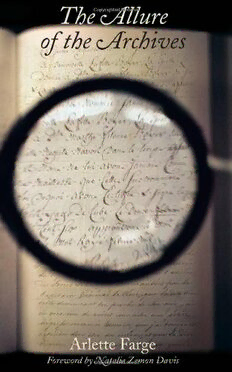
The Allure of the Archives PDF
Preview The Allure of the Archives
The Allure of the Archives This page intentionally left blank The Lewis Walpole Series in Eighteenth- Century Culture and History The Lewis Walpole Series, published by Yale University Press with the aid of the Annie Burr Lewis Fund, is dedicated to the cul- ture and history of the long eighteenth century (from the Glorious Revolution to the accession of Queen Victoria). It welcomes work in a variety of fields, including literature and history, the visual arts, political philosophy, music, legal history, and the history of science. In addition to original scholarly work, the series publishes new editions and translations of writing from the period, as well as reprints of major books that are currently unavailable. Though the majority of books in the series will probably concentrate on Great Britain and the Continent, the range of our geographical interests is as wide as Horace Walpole’s. Arlette Farge The Allure of the Archives Translated by Thomas Scott-R ailton Foreword by Natalie Zemon Davis New Haven & London Published with assistance from the Annie Burr Lewis Fund, and from the foundation established in memory of Philip Hamilton McMillan of the Class of 1894, Yale College. Copyright © 2013 by Yale University. Originally published as Le Goût de l’archive, © Editions du Seuil, 1989; collection La Librairie du XXIe siècle sous la direction de Maurice Olender. Foreword copyright © 2013 by Natalie Zemon Davis. All rights reserved. This book may not be reproduced, in whole or in part, including illustrations, in any form (beyond that copying permitted by Sections 107 and 108 of the U.S. Copyright Law and except by reviewers for the public press), without written permission from the publishers. Yale University Press books may be purchased in quantity for educational, business, or promotional use. For information, please e-m ail [email protected] (U.S. office) or [email protected] (U.K. office). Designed by Lindsey Voskowsky. Set in Adobe Caslon type by IDS Infotech, Ltd. Printed in the United States of America. Library of Congress Cataloging- in- Publication Data Farge, Arlette. [Goût de l’archive. English] The allure of the archives / Arlette Farge ; translated by Thomas Scott- Railton ; fore- word by Natalie Zemon Davis. pages cm. — (Lewis Walpole series in eighteenth-c entury culture and history) Originally published as Le Goût de l’archive. Editions du Seuil, 1989. Collection La Librairie du XXIe siècle sous la direction de Maurice Olender. Includes bibliographical references. ISBN 978- 0- 300- 17673-5 (alk. paper) 1. Archives. I. Scott- Railton, Thomas. II. Davis, Natalie Zemon, 1928– III. Title. CD953.F3713 2013 944.04—dc23 2012048869 A catalogue record for this book is available from the British Library. This paper meets the requirements of ANSI/NISO Z39.48–1992 (Permanence of Paper). 10 9 8 7 6 5 4 3 2 1 Contents Foreword by Natalie Zemon Davis, ix (cid:2) Traces by the Thousands, 1 One Morning in the Library of the Arsenal, 9 (cid:3) On the Front Door, 18 (cid:2) Paths and Presences, 23 The Watchful City, 24 The People Through Words, 26 Her Presence, 32 Conflict, 42 (cid:3) She Has Just Arrived, 47 (cid:2) Gathering and Handling the Documents, 53 “Combing Through the Archives,” 55 The Process of Connection and Contrast, 63 Gathering, 65 Traps and Temptations, 69 (cid:2) Captured Speech, 79 From the Event to History, 80 Fragments of Ethics, 86 The Accidental and the Singular, the Unique and the Collective, 91 Meaning and Truthfulness, 94 Understanding Certain Forms of Popular Expression, 101 (cid:3) The Inventory Room Is Sepulchral, 114 (cid:2) Writing, 121 125 Notes, 131 Translator’s Notes, Foreword Readers of Arlette Farge’s writings have marveled at the world of eighteenth- century France that she has opened before our eyes. Whether in her stylish and lyrical French or in excellent English translation, her books have brought to life women and men of Paris in their workshops, bedrooms, and kitchens; on their doorsteps and in their streets and taverns; making appeals to their parish church and summoned before the commissariat of police. She has retrieved stories of love and abandonment among young working people and servants; of quarrels between apprentices and masters, with the master’s wife standing in the middle; of street crowds gawking at neighbors, or watching executions or fireworks, or marching in vigorous protest. She has helped us hear the sounds of popular Paris life: the timbre of songs sung mock- ingly in front of an employer’s door or chanted sorrowfully at a funeral procession; the slogans of protest and the groans of suffering. She has caught the rumors afloat among the people, the news accounts printed and spread about anything ix
